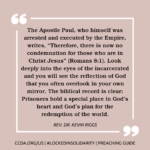My experience in working as a mediator and a director of a community-based ministry has led me to believe that the fields of restorative justice and Christian Community Development should be brought together. Mediation skills and processes are the threads that weave these two practices together. When Christian Community Development, restorative justice and mediation merge, they create a new type of communication called the language of shalom. This language is all about justice, wholeness, soundness, well-being, peace and reconciliation.

My experience in working as a mediator and a director of a community-based ministry has led me to believe that the fields of restorative justice and Christian Community Development should be brought together. Mediation skills and processes are the threads that weave these two practices together. When Christian Community Development, restorative justice and mediation merge, they create a new type of communication called the language of shalom. This language is all about justice, wholeness, soundness, well-being, peace and reconciliation.
In facilitating victim offender mediation (VOM) I have watched victims and offenders come to mediation apprehensively, only to leave empowered with a dramatically changed view of themselves, of the crime or of life. Somewhere along the way of volunteering as a mediator, I became a reconciler and began to view the world through the eyes of a reconciler. When that happened, I began to see reconciliation opportunities everywhere. I realized that standard means of communication are incapable of facilitating reconciliation in such profound ways.
Reconciliation from a biblical perspective requires the prerequisite of accountability on the part of the offender. John 3:19-20 NIV says, “This is the verdict: Light has come into the world, but people loved darkness instead of light because their deeds were evil. Everyone who does evil hates the light, and will not come into the light for fear that their deeds will be exposed.”
Notice the message of accountability in these words. People who love darkness and will not come into the light are not taking responsibility for their actions. According to scripture there is a need for acknowledgment and confession of sin. This sets in motion the process of reconciliation with a righteous and just God. In 1 John 1:9 NKJV, we read, “If we confess our sins, He is faithful and just to forgive us our sins and to cleanse us from all unrighteousness.” According to this scripture, forgiveness—reconciliation with God—comes after confession of sins. If accountability and confession are necessary for reconciliation with God, it makes sense that they are also necessary in order to reconcile people to each other. While VOM does not base its accountability component on biblical demands, it does clearly recognize the human need to take full responsibility for actions and harms. Only then can reconciliation and healing take place. The language of shalom recognizes and bases accountability on biblical demands and speaks to those expectations when working with others.
Reconciliation between God and us begins when we acknowledge what we have done wrong. That is the first part of repentance, or turning away from sin. Reconciliation among individuals, families and communities begins the same way. We must acknowledge our role in causing harm if we hope for reconciliation. We should strive for accountability and responsibility where harm has been done.
As reconcilers, it is not our role to determine who is guilty and who is innocent. This can be sensitive because trying to determine accountability can dissolve into judging others.When this occurs, the reconciler has become a judge. It is human nature to do that. When listening to people’s stories, it may become clear who is wrong and who is right, but we must allow the person to recognize his or her own wrongs. When we determine guilt, we are placing responsibility on someone instead of letting him or her take responsibility.
We can practice accountability in everyday situations. It is easy to see how other people do or do not take responsibility for the harms they have done, but we also need to be intentional about acknowledging our own wrong acts. Being an effective minister of reconciliation is a lifestyle that requires us to be reconciled to people around us. It is hard to admit when we are wrong. But if we push past our own discomfort, admit our guilt and take responsibility, this will help us grow in character. As we model speaking the language of personal accountability, we help create a safe environment. When people feel safe, it is more likely that they will take responsibility.
Cheryl Miller is the Executive Director of Perpetual Help Home, Inc and author of the forthcoming book Language of Shalom: 7 Keys to Practical Reconciliation. Click here to pre-order or to learn more about the book.




